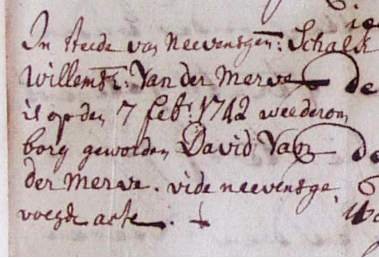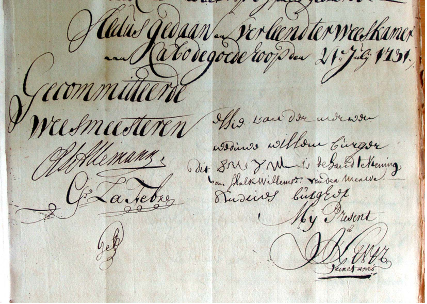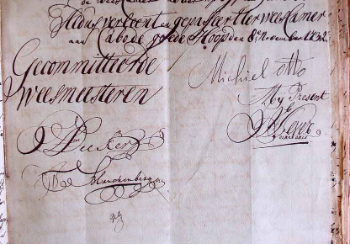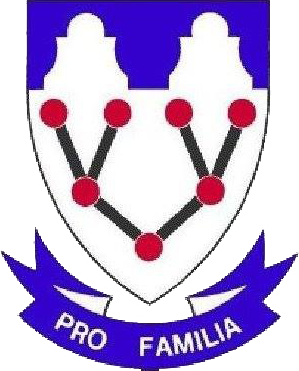MOOC 12 Acte van Bewijs - background
A useful documentary source for the 18th Century Cape by Richard Ball, with many thanks to Corney Keller for advice and examples.
 A series of documents in the Cape Archives which I have found useful in establishing details in some of my genealogical researches are the Acte van Bewijs, also known as Acte van Uijtkoop 1. These are the document series MOOC 12 volumes 1 to 35, part of the Weeskamer or Orphan Chamber archive 2.
A series of documents in the Cape Archives which I have found useful in establishing details in some of my genealogical researches are the Acte van Bewijs, also known as Acte van Uijtkoop 1. These are the document series MOOC 12 volumes 1 to 35, part of the Weeskamer or Orphan Chamber archive 2.
These deeds were drawn up for the Weeskamer and signed by widow or widower as a guarantee of the inheritance of the children of the deceased spouse. Such a deed was required by the Weeskamer if the surviving spouse was going to retain control of the inheritance due to the children, as a safeguard in case of such spouse’s future marriage. They usually name the main party and the deceased spouse, all the children involved along with their ages, names of two guarantors and the details of the contract 3.
The surviving deeds date from 1731 and there is a complete sequence up to 1798. These deeds were also drawn up in earlier years 4 but they appear not to have survived from before 1731.
Occasionally the list of children can, in itself, be of use as, for instance, in the case of the deed of Johanna Conterman, widow of Andries Gouws. There is no baptism recorded for the eldest child named in this document, Pieter Gous; nor was he included among the children of this couple in De Villiers/Pama or the original editions of SAG – it suggested to me a probable solution to the problem of which Pieter Gous married Aletta Vorster 5.
As a bonus, many of these documents also have little marginal notes made during the lifetime of the document. These notes may record that the widow or widower has remarried and give the name of the new spouse, or that a farm, name given, has had its mortgage cancelled and a new mortgage entered into, that one of the guarantors has been replaced, that one of the children has married and therefore taken up their portion of the inheritance, or simply come of age – or in fact died, their portion being then allocated among the surviving children.
The Acte van Bewijs, MOOC 8/1/4, of Eljse van der Merwe, widow of Willem Burger, dated 21st July 1731, states a sum of money which is:
wegens  't vaderlijk be-
't vaderlijk be-
wijs of erfportie die zij eerste comp[aran]te aan ha-
re vijf minderjarige kinderen bij desselfs boven-
gen[oemde]: overledene man Willem Burger in huwe-
lijk verwekt vrijwillig komt te doen, als Ba-
rend oud 10, Schalk Willemsz: oud 8, Martje oud 6,
Anna Sophia oud 4, en Maria Magdalena oud
2 jaren, zijnde ieder hoofd voor hoofd
f 513:2:- vrijgeld, sonder eenige devaloatie
in regten bekent.
"The paternal inheritance portion which she freely acknowledges as due to her five minor children by her deceased husband Willem Burger, namely :
- Barend aged 10,
- Schalk Willemsz: aged 8,
- Martje aged 6,
- Anna Sophia aged 4, and
- Maria Magdalena aged 2 years"
In addition a marginal note reads:
 Dewijl Marritje Burgert
Dewijl Marritje Burgert
ab intestato minderjaarig is
koomen te overlijden, soo is haar
aandeel in deese acte van bewijs
ter groote van rix. 171:2 stu[ijver]s
op haar neevensgen[oemde]: moeder
en vier overgebleevene susters
en broeders naar behooren
overgeschreeven vid boeken
dato 1740 onder ulto. Julij
"Since Marritje Burgert has died intestate as a minor, her share of 171 Rixdollars and 2 stuivers, has been transferred to her mother and the four surviving siblings, reference the account books dated the last day of July 1740."
A second marginal note reads:
 In steede van neevensgen[oemde]: Schalk
In steede van neevensgen[oemde]: Schalk
Willemsz van der Merve
is op den 7 febr: 1742 weederom
borg geworden David van
der Merve, vide neevensge-
voegde acte.
"In place of the below mentioned Schalk Willemsz van der Merwe, David van der Merwe has become guarantor on 7 Feb 1742, as per the enclosed deed."
The document concludes with the signatures:

Aldus gedaan en verleend ter weeskamer
aan Kabo de Goede Hoop den 21: Julij 1731
(signatures)
elsie vander merwen
weduwe willem burger
dit SWvM is de handtekening
van Schalk Willemsz van der Merwe
Andries Burgher
These documents (Acte van Bewijs) can also provide information on step children, for instance that signed by Michiel Otto on 8th of November 1732 (MOOC 12/1/16):

The farmer, Michiel Otto, … acknowledges that he owes to his wife’s four children by her previous husband, the late Barend Gildenhuijsen, namely
- Albert Barend aged 20,
- Hendrik 15,
- Barend 14 and
- Johanna Margareta Gildenhuijsen aged 11 years,
the sum of 6257:5:- guilders, consisting of their paternal portion, a sum of 5562 guilders plus an additional 695:5:- guilders from their deceased sister Geertruij Gildenhuijsen, being her paternal portion.
Footnotes
1) Corney Keller adds: In the notarial deed section of the Amsterdam Archives, these are also known under several other names: Bewijs aan minderjarigen; Bewijs van erfdeel; Akte van vertigting / vertichting; (Vaderlijke/moederlijke bewijs).
2) As listed on the TANAP web site:
http://databases.tanap.net/ead/html/CapeTown_1.3/pdf/CapeTown_1.3.pdf
Note: This website (Tanap) is currently offline and it is unknown if and when it will be restored.
3) Corney Keller adds: This declaration was (indirectly) required by the commissioners of marriage affairs (huwelijkshof) by all widows or widowers (with minor children or heirs of the deceased) with intent to remarry. By indirectly I mean the deed was required by the Orphan Chamber (Weeskamer) which then supplied a declaration to the marriage commissioners stating that the bride or groom to be had fulfilled their obligations to the minors. For instance the note on each of the two entries from the Amsterdam Ondertrouw (marriage notices) register, top left corner reads ‘Weeskamer voldaan ’ plus the date:
| Hij W[ees]kamer voldaen den 17 augustij 1700 |
W[aalse] Kerk
Compareerden als voren Jean Prieur du Pleissis van
Poitiers, chirurijn, wed:r Madelaine
Menanteau, in de Lauriers Straet, en Marie
Beset van Sedan oud 24 jaren, in de
Eerste Leijtze Dwars Straet, ouders doot
geassist. met haer moeje Marie
Biset

|
|
Den 18 Julij 1692
mans doot goet
Compareerden als voren Jan Nobel van Groeningen
winkelier wed:r. Cornelia Claesz
op de Zeedijk, en Grietje Barents
van Neercassel wedu. Hendrik
Harmensz in de Wije Steegh
(they were married on 3 Aug 1692)
4) In MOOC 5, section 7, extracts from Weeskamer records used as a guide to the members, Trijntje Harmens, widow of Willem van Wyk, was in 1702 instructed to provide the Weeskamer with a ‘bewijs’ listing the paternal portions due to her own children as well as the two children from her deceased husband’s first marriage.
5) Which Pieter Gous was Aletta Vorster’s husband?
See https://eggsa.org/index.php/en/contents/articles/8-which-pieter-gous-was-aletta-vorster-s-husband
- Hits: 2345

